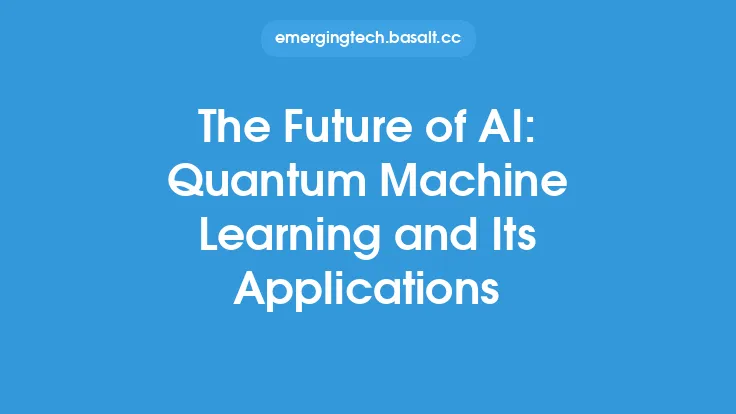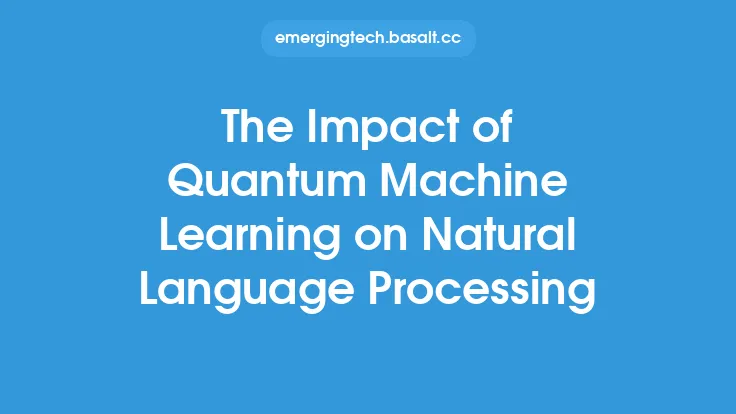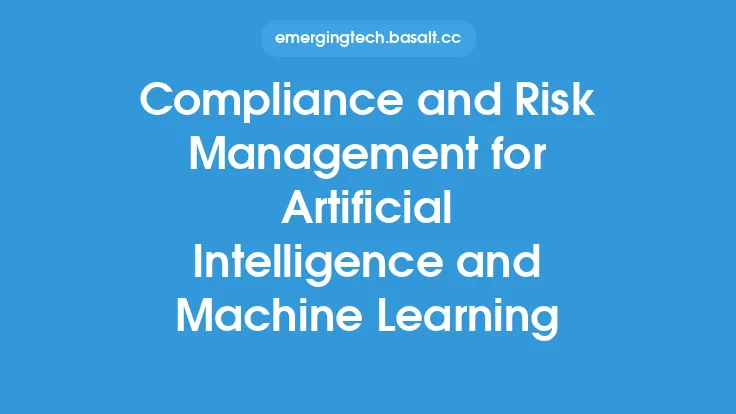The integration of quantum computing and machine learning has the potential to revolutionize the field of artificial intelligence. Quantum machine learning (QML) is a subfield of quantum computing that focuses on the development of quantum algorithms and models for machine learning tasks. By leveraging the principles of quantum mechanics, QML can provide exponential speedup over classical machine learning algorithms for certain tasks, making it an exciting area of research for AI applications.
Introduction to Quantum Machine Learning
Quantum machine learning is based on the concept of quantum computing, which uses quantum-mechanical phenomena, such as superposition and entanglement, to perform computations. In a classical computer, information is represented as bits, which can have a value of either 0 or 1. However, in a quantum computer, information is represented as qubits, which can exist in multiple states simultaneously, allowing for the exploration of an exponentially large solution space in parallel. This property of quantum computing makes it particularly useful for machine learning tasks that involve complex optimization problems.
Quantum Algorithms for Machine Learning
Several quantum algorithms have been developed for machine learning tasks, including k-means clustering, support vector machines, and k-nearest neighbors. One of the most well-known quantum algorithms for machine learning is the Quantum Approximate Optimization Algorithm (QAOA), which is a hybrid quantum-classical algorithm that can be used for optimization problems. QAOA has been shown to provide a significant speedup over classical algorithms for certain machine learning tasks, such as clustering and classification. Another important algorithm is the Quantum Circuit Learning (QCL) algorithm, which is a quantum algorithm for learning quantum circuits. QCL has been shown to be useful for a variety of machine learning tasks, including image recognition and natural language processing.
Quantum Machine Learning Models
Quantum machine learning models are based on the principles of quantum mechanics and are designed to take advantage of the unique properties of quantum computing. One of the most well-known quantum machine learning models is the Quantum Support Vector Machine (QSVM), which is a quantum version of the classical support vector machine algorithm. QSVM has been shown to provide a significant speedup over classical SVM for certain tasks, such as classification and regression. Another important model is the Quantum Neural Network (QNN), which is a quantum version of the classical neural network. QNNs have been shown to be useful for a variety of machine learning tasks, including image recognition and natural language processing.
Quantum Machine Learning Hardware
The development of quantum machine learning hardware is an active area of research, with several companies and organizations working on the development of quantum computers and other quantum hardware. One of the most well-known quantum machine learning hardware platforms is the IBM Quantum Experience, which is a cloud-based quantum computer that can be used for a variety of machine learning tasks. Another important platform is the Google Quantum AI Lab, which is a cloud-based quantum computer that can be used for machine learning and other AI applications. The development of quantum machine learning hardware is critical for the advancement of QML, as it will enable researchers to test and develop new quantum algorithms and models.
Challenges and Limitations
Despite the potential of quantum machine learning, there are several challenges and limitations that must be addressed. One of the main challenges is the development of robust and reliable quantum hardware, which is necessary for the implementation of quantum algorithms and models. Another challenge is the development of quantum algorithms and models that can be used for practical machine learning tasks, such as image recognition and natural language processing. Additionally, the noise and error correction in quantum computers are significant challenges that must be addressed in order to achieve reliable and accurate results.
Applications of Quantum Machine Learning
Quantum machine learning has the potential to be used for a variety of applications, including image recognition, natural language processing, and predictive modeling. One of the most exciting applications of QML is the development of quantum-inspired machine learning models, which can be used for classical machine learning tasks. These models have been shown to provide a significant improvement in performance over classical models for certain tasks, such as image recognition and natural language processing. Another important application of QML is the development of quantum machine learning-based recommender systems, which can be used for personalized recommendation and advertising.
Future Directions
The future of quantum machine learning is exciting and rapidly evolving. One of the main areas of research is the development of new quantum algorithms and models for machine learning tasks, such as clustering and classification. Another area of research is the development of quantum machine learning-based applications, such as image recognition and natural language processing. Additionally, the development of quantum machine learning hardware is critical for the advancement of QML, as it will enable researchers to test and develop new quantum algorithms and models. As the field of quantum machine learning continues to evolve, we can expect to see significant advancements in the development of new quantum algorithms, models, and applications, which will have a major impact on the field of artificial intelligence.
Conclusion
In conclusion, quantum machine learning is a rapidly evolving field that has the potential to revolutionize the field of artificial intelligence. By leveraging the principles of quantum mechanics, QML can provide exponential speedup over classical machine learning algorithms for certain tasks, making it an exciting area of research for AI applications. While there are several challenges and limitations that must be addressed, the potential of QML is significant, and we can expect to see significant advancements in the development of new quantum algorithms, models, and applications in the coming years. As the field of quantum machine learning continues to evolve, it is likely to have a major impact on the field of artificial intelligence, enabling the development of more powerful and efficient machine learning models and applications.





